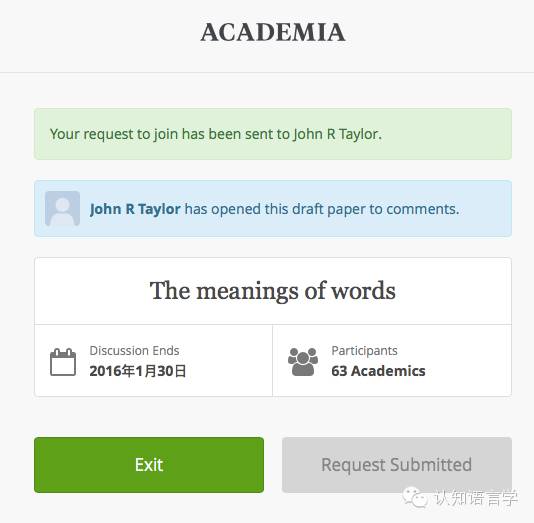最近一个月,知名认知语言学家John R. Taylor先生为了完善他为即将出版的《剑桥认知语言学手册》编写的章节内容,于国际知名学术研究社交媒体Academia.edu,开设专门的“The meanings of words”板块,邀请全球学者参与讨论、提供建议。
Taylor先生所编写的章节初定标题为“Lexical semantics, or: What does it mean to know the meaning of word?”,主要围绕词汇语义分析的三种思路及其相关论题展开回顾和深入讨论,同时阐明认知语义观的分析路径和优势。该章节草稿可于Academia.edu网站获得,亦可点击CogLing微博网盘提取:http://vdisk.weibo.com/s/diG1ZcnI7dn_K
“The meanings of words”讨论板块开放以来,引来较高浏览量。全球学者提出了很多问题和建议,其中以我国知名认知语言学学者张韧教授和Taylor先生的精彩互动尤为引人注目:张韧教授凭借对于认知语法和认知语言学的深刻见解和相关分析手段的熟练掌握,针对Taylor提出的第三种词义分析思路提出了具体问题和独到见解。
小编节选两位学者(以下简称Zhang和Taylor)互动讨论的部分内容,以飨读者。

Zhang:I feel interested in the way the instability of word meaning is highlighted by different instantiations of e.g.,the patterns Open +NP, V+ the window. Taylor’s solution to this problem is to appeal to Langacker’s notion of encyclopedic base and words as “paths ofaccess” to that base. I completely agree with this position. However, Iwould love to see more specific discussion of how verbs and nouns access different aspects of knowledge in different uses, in the set of instances given(e.g. break/install/sit in the window; open the window/your eyes, etc.) (I felt the same need after reading Taylor’s Mental Corpus (2012)). Taylor acknowledges the existence of default paths of access (what would be the default of”open” and “window”?). Does the default path play any rolein particular usages of these words? In other words, I am still curious whetherit is cognitively plausible to describe the conceptual content of”open” and “window” per se, as abstracted from usages,perhaps in terms of “default access path”? Or should speakers simply commit to memory different exemplars of Open + NP, V+the window , which seems to be where you are going in Mental Corpus?
Taylor:Dear Ren Zhang, Thank you for your comments. The exploration of “paths of accesss” does need more work.On the possibility of word meanings independent of their uses, you might try the following: Ask a person to state the meaning of some quite ordinary word.Unless the word is a noun with a fairly obvious referent, one likely responseis: “Give me context!”, and the person then paraphrases, or enacts,the contextualized use. Another response appeals implicitly to a contextualized use, which is then paraphrased. This suggests to me that words are indeed stored in contextualized units. After all, you hardly ever learn — at least,not in naturalistic situations — words in isolation. Words are (nearly always) encountered in contexts.
Zhang:Dear John, thanks for your illuminating reply, which seems to consolidate your Mental Corpus position. I agree that people’s lexical knowledge is typically inextricable from the contextualized patterns in which they are found. However, it’s not clear that these stored patterns could by themselves sanction novel uses (cf. different exemplars of “open X”), unless the speaker sees some commonality (which may be abstract to different degrees) between the novel use and the stored patterns. There is also a question of how the stored uses are themselves learned. People may indeed feel difficult to give the meaning of “open” independently of contextualized uses, but it’s another matter whether they are able to identify the possible similarity in the different exemplars of “open X” (cf.open the window/your eyes, etc.). In a word, both contextualized uses and schematic extraction may be needed in linguistic activities, a standard view, I think, of cognitive grammar.
理论的探讨和争论本就永恒。理不辨不明,各位研习认知语法和认知语言学的同行们,假如错过了和Taylor讨论的机会(加入讨论需要Taylor本人通过验证,而小编“功力不够”,也就没这个机会了,看图便知)。

故此,小编推荐大家和张韧教授联系交流,就认知语言学和认知语法的论题继续交换观点、持续互动。张韧教授的email: ryan66@163.com。亦可关注CogLing微博:http://weibo.com/CogLing,留下您的宝贵意见,小编亦会转给张韧教授。